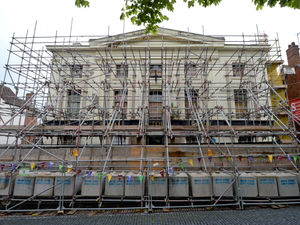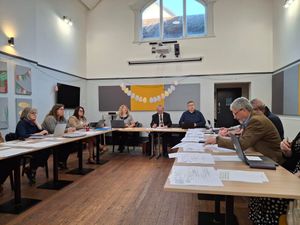Hotel developers let off paying £88k school and playground contributions
Developers hoping to save a historic former hotel and convert it into flats have been excused from paying school and play area contributions that they said made the project “unviable”.

Earlier this week, Town Centre Properties UK Ltd were granted permission to convert Newport’s Royal Victoria Hotel Newport into 17 apartments.
A previous planning decision on the site obliged the company and Wem-based co-applicants Hawk Developments UK Ltd to contribute £88,870 towards education and recreation.
Hawk Developments applied to have this removed, saying project finances were “finely balanced” but just about viable without it, and Telford & Wrekin Council’s Planning Committee voted unanimously to allow the change.
Members said they were “reluctant” but acknowledged it would save the grade II listed building front.
A report for the committee said: “In December 2018, the applicant’s primary funder was placed into administration and placed in a position of having to re-pay borrowings with a half-completed development with no immediate finance to complete it, resulting in a substantial loss.”
Section 106 of the 1990 Town and Country Planning Act allows councils to enter into contracts – which can include requests for money for local facilities – with developers.
“Officers accept the applicant’s justification that the section 106 agreement as approved is now unviable and needs to be reconsidered for the applicant as a willing developer to bring the site forward,” the report said.
“The applicant has demonstrated that, with the omission of the commuted sums, the proposed development of the site is financially viable, albeit acknowledging that the financial viability is relatively finely balanced,” the report concluded, recommending councillors green-lit the necessary “deed of variation”.
Area Team Planning Manager Mark Turner told the committee Newport Town Council had been consulted about the move.
Summarising its response, he said the money has “always been part of the declaration for the ongoing costs for delivery of the development, and it is now considered disingenuous to be revisiting the obligation for what is a very modest contribution”.
It also said “this request may set an unwelcome precedent for future developers to avoid paying section 106 contributions”.
Addressing that last point, Mr Turner said all deed of variation applicants had to submit viability evidence, and each case was independently assessed on its own merits.
Newport Town Council’s response said members “remain of the opinion that this development needs to come to fruition” as the St Marys Street site is “an ever-increasingly dangerous structure and eyesore within the town centre Conservation Area”.
Town councillors suggested enforcement action and compulsory purchase as options to keep the building safe.
Committee member Peter Scott, who represents Newport North and West, said the building had become a “real eyesore” and was in poor condition internally.
“Quite honestly, when the scaffolding comes down it may fall down,” he said.
“Everyone in the Newport area feels there should be a resolution on this whatever happens.”
He said the committee “needs to be very careful” about “opening it up for other people to, basically, welch on the deal when it comes to 106 money”, but said it was important to save the building.
Councillor Nigel Dugmore said: “I’m trying desperately to feel that we’re not being held to ransom here, but we are, in a way.
“Can we not put any conditions on this, that it has got to be done in a specific time period or something like that?”
Development Management Service delivery manager Valerie Hulme said the two applications on the site, dating from 2016 and August this year, were both now approved, so conditions could not be added retrospectively.
But she said council officers held regular meetings with the developer to ensure progress, and could use “other realms of legislation” if the project stalls.



